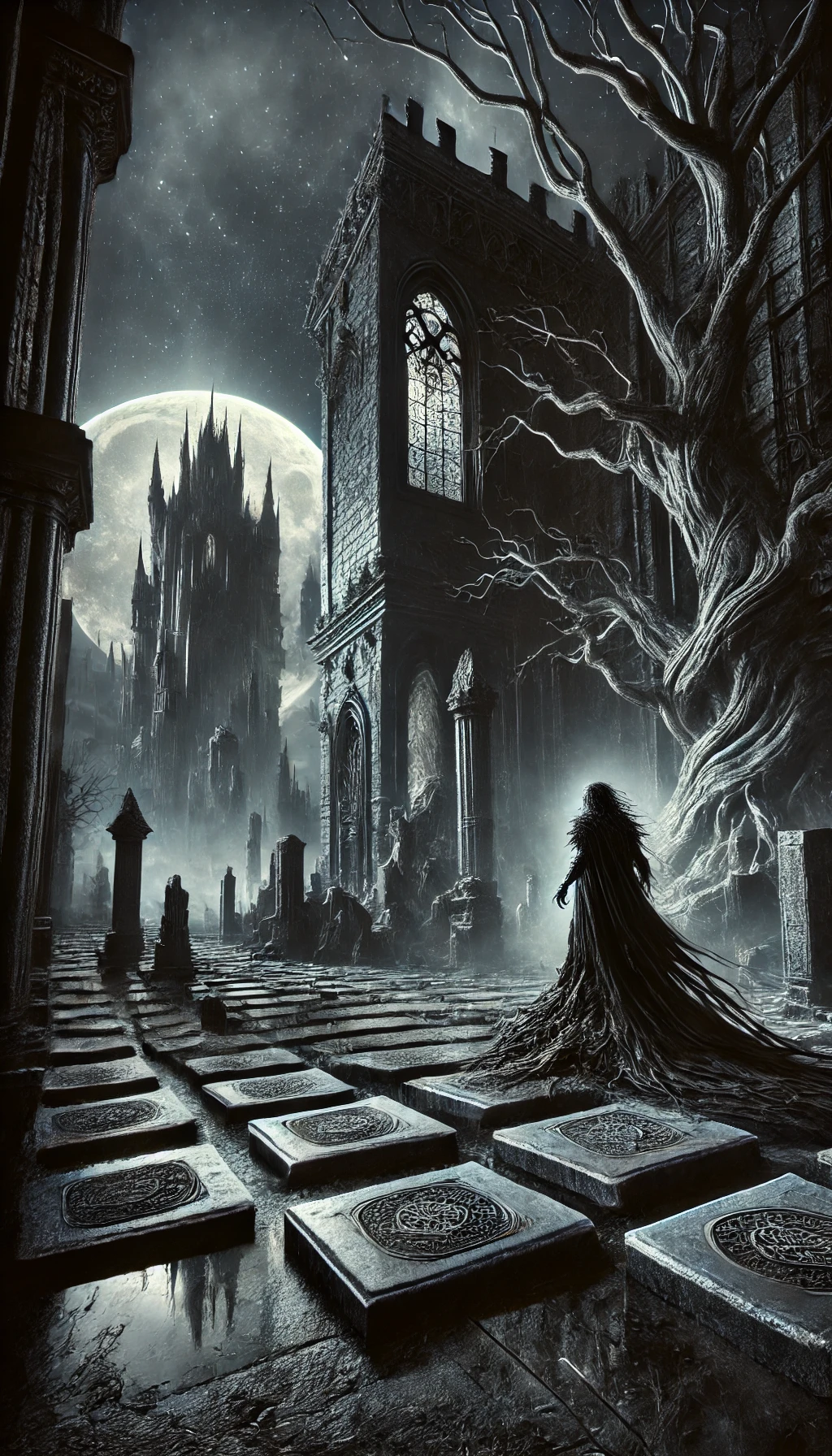The Cask of Amontillado by Edgar Allan Poe, published in 1846, is a chilling short story of revenge and betrayal set in an unnamed Italian city during the chaotic revelry of Carnival. The narrative follows Montresor as he seeks retribution against Fortunato, a friend turned foe, whose unnamed insult has led Montresor to meticulously plan a dark act of vengeance.
Plot Summary
At the height of Carnival, in a city alive with masks, music, and revelry, Montresor moved through the chaotic streets, searching for Fortunato. Spotting him, Montresor approached with warmth and admiration, his voice echoing above the din. Fortunato, half inebriated and dressed in a gaudy jester’s outfit complete with bells, greeted him with unrestrained enthusiasm. Montresor smiled, letting his gaze linger as if in admiration. Tonight was the night. His plan, carefully prepared and meticulously rehearsed, was ready. He led Fortunato toward a promise, whispering the enticing word that would drive his prideful friend to follow without hesitation—Amontillado.
Fortunato’s pride as a connoisseur of wine was his weakness. The promise of a rare, fine Amontillado stirred him, and he leapt at the chance to judge it. Montresor feigned hesitation, planting doubts about whether it was truly Amontillado or simply a poor substitute. But Fortunato’s intoxicated arrogance quickly took over. He dismissed Montresor’s concerns, insisting his expertise was superior to any other judge’s, including Luchesi’s, another respected wine aficionado. The lure had been set perfectly, and as Fortunato laughed at the mention of Luchesi’s name, Montresor pressed him, remarking that he wouldn’t dare waste Fortunato’s time if he were already committed elsewhere. But Fortunato insisted, and so, arm in arm, they moved from the festivity into the cold, damp quiet of Montresor’s home.
Upon entering, Montresor grabbed two flambeaux, casting flickering shadows across the empty mansion as they passed through hallways and down into the catacombs. The labyrinthine passages, lined with walls of bones and coated in the chilling dampness of nitre, descended deeper beneath the earth. Fortunato coughed as they walked, the damp air tightening around him, but he laughed it off, brushing aside Montresor’s concerns about his health. Each cough, every uneasy glance at the nitre-encrusted walls, only reassured Montresor. His guest’s discomfort and faltering breath were as welcome to him as the wine he offered Fortunato at intervals, each sip adding weight to his friend’s unsteady steps.
The wine flowed, and Fortunato drank freely, the sparkle in his eyes dulled by drink and the dark passageways around them. With each step, the sounds of the festival faded, swallowed by the silence and the heavy smell of ancient stone. Montresor watched his guest with satisfaction as they ventured further, surrounded now by the resting places of Montresor’s ancestors, whose bones lay undisturbed beside casks and barrels from forgotten years. When Fortunato began to falter, Montresor steadied him, gently urging him forward, encouraging his guest’s growing sense of expectation and confidence. Montresor’s words, though warm, had a glint of irony that eluded Fortunato’s inebriated mind.
When they reached the end of the passage, they found themselves in a cramped crypt, lined with bones stacked to the ceiling and a narrow opening in the wall. Montresor paused, holding up the light to cast the shadows away. Fortunato, now visibly affected by the wine, stepped forward, his gaze fixed on the small recess ahead. Montresor gestured, inviting him into the small, dim alcove. Fortunato entered, his steps slow, and Montresor’s voice floated behind him, a faint echo of encouragement. The alcove was empty; there was no Amontillado. For a moment, Fortunato looked around, his confusion deepening as he turned, his gaze landing on Montresor. But Montresor was already securing him, locking a chain around his waist and binding him tightly to the wall. Fortunato, at first, only stared.
As the cold metal touched his skin, a flash of clarity broke through Fortunato’s drunken haze. He tugged against the chain, but the restraint held firm. Montresor watched in silence, his satisfaction hidden behind a mask of calm. Fortunato, struggling against the cold, immovable wall, tried to brush it off, as if Montresor’s actions were no more than a jest. He laughed, though weakly, and his voice, once full of bravado, wavered as he called to Montresor, asking him to let him go. But Montresor only replied with quiet, almost comforting words, never once letting the true depth of his intention appear.
Montresor left his friend chained and helpless, moving to a pile of stones and mortar he had prepared earlier, knowing that this moment would come. He began building a wall, layer by layer, blocking the small crypt with Fortunato inside. Fortunato, struggling to comprehend, called to him, pleading, still attempting to frame the entire ordeal as a twisted joke. His voice grew louder, and soon his pleas turned into panicked screams, echoing in the confined space. But Montresor, with steady resolve, continued his work, never once faltering as the stones rose, shutting out Fortunato’s voice. Only when silence fell did Montresor pause, but the sound of the bells on Fortunato’s jester hat broke the stillness, a faint, ominous reminder of the man now sealed away.
Montresor’s final task was nearly complete, the wall of stone nearly reaching his shoulders. He placed the final stone carefully, sealing the opening fully. A faint laugh came from within the wall, a desperate sound devoid of its former bravado. Fortunato’s voice echoed, weak and pleading, as he invoked Montresor’s compassion, entreating him in the name of God to let him go. But Montresor’s expression remained cold, his hands steady as he pressed the last stone into place, enclosing Fortunato in eternal darkness. As the final stone was secured, Montresor turned his back on the makeshift tomb, his satisfaction tempered only by the weight of his own silence.
Decades would pass, and no one would uncover Fortunato’s final resting place, hidden behind layers of bone and stone, lost within the depths of the Montresor catacombs. Montresor’s revenge had been exacted with a meticulous cruelty, a memory he would carry with him as he continued his life aboveground, untouched by justice or retribution, as if no wrong had ever been committed. And in the silence of the catacombs, Fortunato lay undisturbed, as Montresor had intended, leaving his victim in peace to an eternity of darkness.
Main Characters
Montresor: The narrator and protagonist, Montresor is a cunning and vengeful man who carefully orchestrates Fortunato’s demise. His motivations are grounded in a perceived insult, and his cold, calculating nature guides him as he lures Fortunato into a deadly trap. Montresor’s intellect and ability to feign friendship make him both sinister and disturbingly methodical in his quest for revenge.
Fortunato: A wealthy and respected man known for his pride and expertise in wine, Fortunato becomes the unsuspecting victim of Montresor’s revenge. His arrogance and drunkenness render him vulnerable to Montresor’s manipulation, leading him deeper into the catacombs where his fate awaits.
Theme
Revenge and Justice: Montresor’s desire for vengeance is the driving force of the story, with the line between justice and revenge blurred. He seeks retribution not only for an injury but for a vague insult, reflecting on how personal vendettas can warp one’s sense of morality.
Deception and Betrayal: Montresor pretends to be Fortunato’s friend, using deception to achieve his ends. This theme is woven into every aspect of the narrative as Montresor lures Fortunato with false friendship and trust, only to betray him fatally in the end.
Pride and Foolishness: Fortunato’s pride in his wine expertise leads him to ignore warning signs and persist through increasingly dangerous situations. This theme underscores the fatal consequences of hubris and how one’s ego can be a vulnerability.
The Power of the Setting: Poe sets the story in dark, labyrinthine catacombs filled with bones, creating an atmosphere of death and dread. The oppressive, claustrophobic environment mirrors Montresor’s dark intentions and the inescapability of Fortunato’s fate.
Writing Style and Tone
Edgar Allan Poe’s writing in The Cask of Amontillado is dense, atmospheric, and vividly descriptive. He carefully crafts each sentence to maintain suspense and a sense of dread, embedding hints of Montresor’s sinister intent in seemingly innocuous dialogue. Poe’s use of first-person narration gives readers insight into Montresor’s disturbed mind, while still leaving many questions unanswered, creating a mystery that feels intimate yet incomprehensible. His precise language is a powerful tool, establishing the story’s psychological tension through calculated irony and subtle foreshadowing.
The tone of The Cask of Amontillado is dark, ominous, and sinister, capturing the Gothic atmosphere Poe is known for. The story unfolds with a sense of inevitable doom, as each step Montresor and Fortunato take through the catacombs symbolizes Fortunato’s descent into danger. Poe balances the grotesque elements with irony and horror, creating a story that feels both immediate and hauntingly suspenseful, even as Montresor recounts the events long after they have transpired.
We hope this summary has sparked your interest and would appreciate you following Celsius 233 on social media:
There’s a treasure trove of other fascinating book summaries waiting for you. Check out our collection of stories that inspire, thrill, and provoke thought, just like this one by checking out the Book Shelf or the Library
Remember, while our summaries capture the essence, they can never replace the full experience of reading the book. If this summary intrigued you, consider diving into the complete story – buy the book and immerse yourself in the author’s original work.
If you want to request a book summary, click here.
When Saurabh is not working/watching football/reading books/traveling, you can reach him via Twitter/X, LinkedIn, or Threads
Restart reading!








